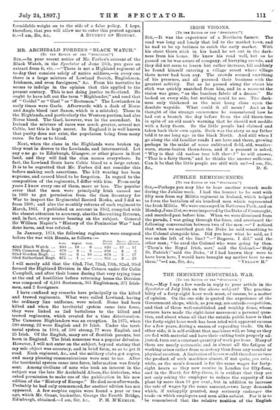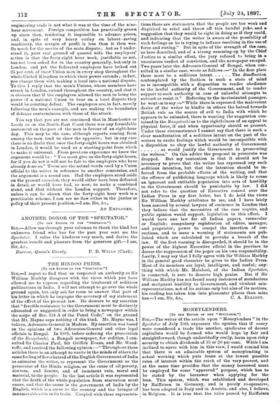THE IMMINENT INDUSTRIAL WAR.
[To THE EDITOR OF THE "SPECTATOR.] Sin,—May I say a few words in reply to your article in the Spectator of July 10th on the above subject? The practica- bility of a forty-eight hour week must, of course, be a matter of opinion. On the one side is quoted the experience of the Government shops, which, as you say, are outside competition, and that of three well-established and wealthy firms, whose owners have made the eight-hour movement a personal ques- tion, and about whom all that the outside public know is that the forty-eight hour week has been tried with apparent success for a few years, during a season of expanding trade. On the other side, it is self-evident that machines will, so long as they are fed with material and have their cutting tools properly ad- justed, turn out a constant quantity of work per hour. Many of them are nearly automatic, and in almost all the fatigue of working arises rather from monotony than from any mental or physical exertion. A limitation of hours would therefore reduce the product of such machines almost, if not quite, pro rata ; while, as the men's demand is for the same wages for forty- eight hours as they now receive in London for fifty-four, and in the North for fifty-three, it is evident that they are not only asking the employer to reduce the capacity of his plant by more than 10 per cent., but in addition to increase the rate of wages by the same amount,—two large demands which, if unhappily granted, may seriously endanger the trade on which employers and men alike subsist. For it is to be remembered that the relative Position of the English
engineering trade is not what it was at the time of the nine- hour movement. Foreign competition has practically grown up since then, rendering it impossible to advance prices, and, in spite of very heavy outlay on labour - saving machinery, the margin of profit is less than it then was. So much for the merits of the main dispute ; but as I under- stand it, your real ground of quarrel with the employers' action is that the forty-eight hour week, justifiable or not, has not been asked for in the country generally, but only in London, and yet the federated employers have locked out 25 per cent, of their Union men in every shop throughout the whole United Kingdom to which their power extends ; in fact, you charge them with making a local into a national dispute. To this I reply that the men's Unions, whose members have struck in London, extend throughout the country, and that it is obvious that if the employers allowed the men to bring the power of a national Union to bear on a local dispute they would be courting defeat. The employers are, in fact, merely following the men's example, and are making the boundaries of defence conterminous with those of the attack.
You say that you are not convinced that in Manchester or Leeds or on the North-East Coast there was any formidable movement on the part of the men in favour of an eight-hour day. This may be the case, although reports coming from among the men tend to show the opposite ; but in any case there is no doubt that once the forty-eight hours was obtained in London, it would be used as a starting-point from which to make it universal. From previous experience we know the argument would be : "You must give us the forty-eight hours, for if you do not it will not be fair to the employers who have already done so." These are the actual words used by a Union official to the writer in reference to another concession, and the argument is a sound one. Had the employers stood aside on the present occasion, they would either have been defeated in detail, or would have had, as now, to make a combined stand, and that without the London support. Therefore, unless it can be shown that the forty-eight hour week is a practicable scheme, I can see no flaw either in the justice or policy of their present position.—I am, Sir, &c., AN EMPLOYER.



































 Previous page
Previous page